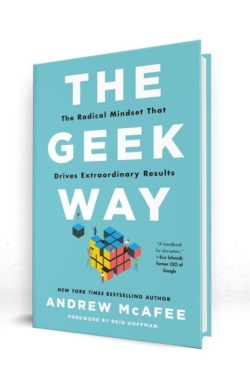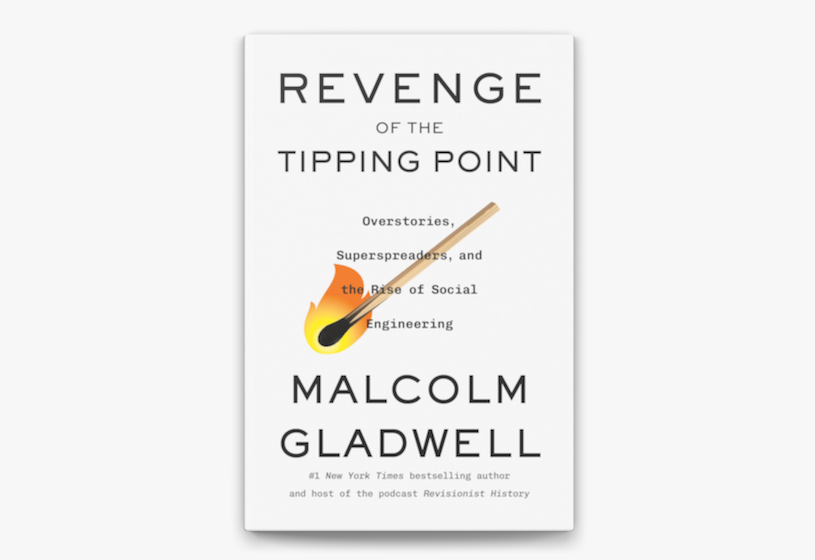
THE GEEK WAY: The Radical Mindset that Drives Extraordinary Results
by Andrew McAfee
Little, Brown & Company
336 pages
Mr. McAfee, a research scientist at MIT and the author of several books on business and technology, proposes a radical rethink along the lines of successful digital enterprises such as Amazon and Netflix—companies founded and run by those he calls “business geeks.” These are the maverick thinkers who’ve come up with unconventional methods for running a corporation. Their ideas are “cultural solutions, not technological ones,” the author stresses. They aren’t restricted to—or even always practiced by—tech companies. Anyone can play.
The “geek way,” as laid out by Mr. McAfee, is a product of four basic values: speed, ownership, science and openness. “Speed” means implementing ideas quickly, even if they’re not quite ready: You’ll learn more by iterating than by sitting in endless planning sessions. “Ownership” means letting employees own the jobs they perform, rather than follow dictates from the top. “Science” is shorthand for following the evidence, not your own opinions—or Roberto Goizueta’s, if you happened to work for the Coca-Cola chief executive in the 1980s. (Blind taste tests indeed showed that people preferred New Coke’s sweeter formulation, but Goizueta failed to realize that the issue wasn’t taste, it was whether to tinker with a classic.) “Openness” conveys a willingness to hear what other people have to say. For executives who have bought into the idea of “leadership,” not to mention their own brilliance, this might be the hardest lesson of all. Yet if he had listened to others, Jeffrey Katzenberg might not have burned through $1.75 billion in funding for Quibi at a rate of millions of dollars a day before calling it quits.
It’s not only leadership that’s at stake, it’s the whole idea of how to run a company. Forget elaborate procedures, long meetings, strict hierarchies and deference to authority, Mr. McAfee says. Forget the command-and-control ethos at the root of all this. “Command” often takes you into the weeds, and “control” ensures you stay there. “The geek way leans into arguments and loathes bureaucracy,” the author writes. “It favors iteration over planning, shuns coordination, and tolerates some chaos. Its practitioners are . . . not afraid to fail, challenge the boss, or be proven wrong. Instead of respecting hierarchy and credentials, they respect helpfulness and chops.”
Problems with bureaucracy and hierarchy have been noted before. What distinguishes The Geek Way is Mr. McAfee’s focus on cultural anthropology. He notes that sociability is “humanity’s superpower,” but it’s also our kryptonite. Group behavior is the source of any number of problems. Bureaucracy stems from our innate drive for status. Striving to look and feel important, executives insert themselves into routine procedures—which is why one Hewlett-Packard manager needed the approval of 20 people, most of whom she’d never heard of, to hire some outside consultants. Our highly social nature likewise helped doom Arthur Andersen once it started providing, as Mr. McAfee puts it, “clean audits . . . for dirty clients.” If everybody does it, who is going to speak up? Eventually the rot became so routine that the head of ethics padded her fees at the insistence of a partner.
Geeks, too, can lose their way. In 2011 Netflix’s CEO, Reed Hastings, decided to split the company; one half would focus on the new business of streaming while the other half continued distributing DVDs by mail. Unfortunately, Mr. Hastings violated the norm of openness by failing to ask for employee feedback. Brickbats ensued. “Better choices have been made at 24/7 Las Vegas chapels after too many Limoncello shots,” one commentator quipped. By the time Mr. Hastings reversed himself, the company’s stock had fallen by 75%. But he learned his lesson: Netflix executives have since been required to “farm for dissent” before launching any major initiative.
Like Mr. Katzenberg, Mr. Hastings succumbed to the temptation of management by Hippo—a derisive acronym devised by Google engineers to stand for “Highest-Paid Person’s Opinion.” Hippo has run wild at Facebook, which changed its name to Meta after Mark Zuckerberg, the company’s CEO and controlling shareholder, decided that the future of computing lay in the metaverse. Mr. Zuckerberg, who by one estimate had thrown some $15 billion at the idea by the end of 2022, answers to no one, least of all his employees—some of whom are said to refer to the metaverse project as MMH, short for “Make Mark Happy.”
Few of the ideas presented by Mr. McAfee are original; they’ve been floating around Silicon Valley for years, and they are emblematic of the systems approach that’s gone in and out of fashion at business schools for decades. The author cites Chris Argyris, a longtime Harvard Business School professor who, in the 1970s and ’80s, exposed the flaw at the heart of conventional management thinking, which touts control and positive thinking as power moves. Argyris pointed out that such tactics instead give rise to self-serving and defensive behavior. Nor do Mr. McAfee’s prescriptions guarantee a positive outcome for society at large: Geek companies, the author notes, don’t necessarily do well at attracting women and minorities, protecting workers’ health, or preventing fake news and hate speech.
But societal ills are beyond the scope of this book. The Geek Way shows how easy it can be to slip into such organizational flaws as runaway bureaucracy and management by fiat. By fashioning the alternatives into a coherent system, Mr. McAfee has created a powerful synthesis that anyone who occupies or aspires to a position of authority would do well to explore. ◼︎


 December 11, 2023
December 11, 2023




